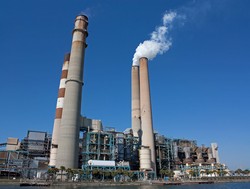Presbyterian Church (U.S.A.) environmental leaders say they’re disappointed by yesterday’s ruling from the U.S. Supreme Court. The high court ruled against the Environmental Protection Agency’s efforts to put a limit on certain power plant emissions saying it did not consider the cost of those regulations and its financial impact on energy corporations.
In a 5-4 vote, the Supreme Court ruled that the health or environmental benefits could not match the billions of dollars energy corporations would have to pay to be compliant saying “EPA must consider cost—including cost of compliance—before deciding whether regulation is appropriate and necessary.”
The EPA’s rules to limit the emissions of hazardous air pollutants, including mercury, went into effect in April.
“PC(USA) General Assemblies have stated in no uncertain terms that energy choices and our effect on God’s creation in general are moral choices. We do not make environmental decisions primarily on the financial prudence involved,” said Rebecca Barnes, associate for Environmental Ministries. “While energy efficiency does indeed save congregations money that can be put toward mission, many churches are making energy efficiency changes as a way to be faithful to God’s call to tend the garden.”
Barnes said Presbyterians have a long history of caring for God’s creation in homes, churches and public spaces without calculating how much someone’s health, child and future well-being is worth economically.
Other environmental leaders believe the ruling and continuous legal challenges could make it difficult for the U.S. to convince other countries to control emissions when meeting this December in Paris on a new international treaty.
Justice Antonin Scalia, in the majority opinion said that the cost to power plants could run as much as $10 billion a year, “EPA refused to consider whether the costs of its decision outweighed the benefits. The agency gave cost no thought at all, because it considered cost irrelevant to its initial decision to regulate.”
EPA officials have expressed disappointment in the court decision, but added that many plants have already invested in measures to improve compliance. In a prepared statement, agency officials said that for every dollar spent to reduce pollution under the regulations, “the American public would see up to $9 in health benefits.” The agency added, “EPA remains committed to ensuring that appropriate standards are in place” to curb air pollution.
“I mourn that human health, social justice and larger environmental risks are not considered inherently equal to, or more valuable than, a company’s potential lost revenue,” added Barnes. “While I anticipate that costs will be recalibrated as requested, and the EPA regulations could possibly proceed, there still remains the dissonance for me that ‘cost’ can be given so much weight. Surely we live in a time where we do not need to pit clean air against financial gain.”
Barnes added that the gift of breath that God gave the world is a priceless commodity, freely given to all and worth protecting at all costs.

